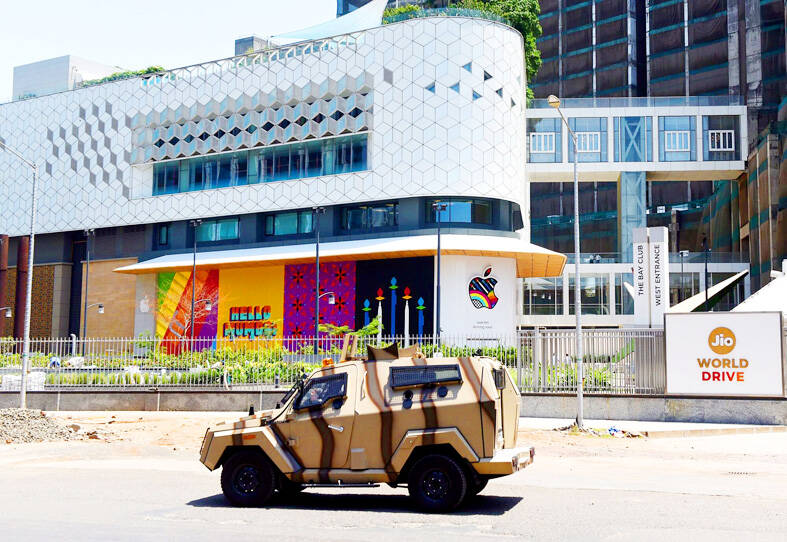Apple Inc assembled more than US$7 billion of iPhones in India last fiscal year, tripling production in the world’s fastest-growing smartphone arena after accelerating its move beyond China.
The US company now makes almost 7 percent of its iPhones in India through expanding partners from Foxconn Technology Group (富士康科技集團) to Pegatron Corp (和碩), people familiar with the matter said.
That is a significant leap for India, which accounted for an estimated 1 percent of the world’s iPhones in 2021.

Photo: Bloomberg
Apple is exploring ways to reduce its reliance on China as tensions between Washington and Beijing continue to escalate.
Its longtime partners, who make most of the world’s iPhones in sprawling factories in China, have added assembly lines in other countries at a rapid pace over the past year, the people said on the condition of anonymity.
The world’s most valuable company struggled last year with chaos at Foxconn’s main “iPhone City” complex in Zhengzhou, which drove home vulnerabilities in Apple’s supply chain and forced it to cut output estimates.
Of the total production, Apple exported US$5 billion of iPhones in the fiscal year ended last month, nearly four times as much as the previous period, the people said.
Apple is likely to manufacture the next iPhones in India at the same time as in China, sometime in the fall of this year. If so, that would be the first time that iPhone assembly begins concurrently in the two countries.
If the aggressive expansion of its suppliers continues, Apple could assemble one-quarter of all its iPhones in India by 2025.
Even before last year’s iPhone City difficulty, Apple had recognized the need to diversify its supply chain. It successfully lobbied for incentives in India and pushed suppliers Foxconn, Pegatron and Wistron Corp (緯創) to ramp up locally. The trio, which together employ about 60,000 workers in India, make models ranging from the aging iPhone 11 to the latest iPhone 14.
That has helped place Apple at the heart of India’s ambitions to become a major manufacturing alternative to China.
Apple is among the world’s most exacting when it comes to manufacturing. Its production chain encompasses hundreds of companies across the world and employs millions, much of that now in China.
The migration of iPhone production represents an economic triumph for India that could have implications for how other US brands plan their futures. For Apple, the country itself represents a fount of future growth as the Chinese economy sputters.
Apple is scheduled to open its first two retail stores in India next week, one in the financial hub of Mumbai and another in the capital New Delhi.
Apple CEO Tim Cook is scheduled to fly in to inaugurate the two stores, underscoring the domestic market’s rising importance.
Apple has also sought changes in India’s labor laws as part of its effort to expand local production and create mega factories.
Its largest contract manufacturer, Foxconn, plans to invest about US$700 million in a southern state to make phone components and possibly iPhones.
The tech industry’s reliance on China could be reduced by 20 to 40 percent by 2030, Bloomberg analysts said, adding that it could take years of investment to untangle from China’s complex, efficient and skilled supply chain.

Macronix International Co (旺宏), the world’s biggest NOR flash memory supplier, yesterday said it would spend NT$22 billion (US$699.1 million) on capacity expansion this year to increase its production of mid-to-low-density memory chips as the world’s major memorychip suppliers are phasing out the market. The company said its planned capital expenditures are about 11 times higher than the NT$1.8 billion it spent on new facilities and equipment last year. A majority of this year’s outlay would be allocated to step up capacity of multi-level cell (MLC) NAND flash memory chips, which are used in embedded multimedia cards (eMMC), a managed

CULPRITS: Factors that affected the slip included falling global crude oil prices, wait-and-see consumer attitudes due to US tariffs and a different Lunar New Year holiday schedule Taiwan’s retail sales ended a nine-year growth streak last year, slipping 0.2 percent from a year earlier as uncertainty over US tariff policies affected demand for durable goods, data released on Friday by the Ministry of Economic Affairs showed. Last year’s retail sales totaled NT$4.84 trillion (US$153.27 billion), down about NT$9.5 billion, or 0.2 percent, from 2024. Despite the decline, the figure was still the second-highest annual sales total on record. Ministry statistics department deputy head Chen Yu-fang (陳玉芳) said sales of cars, motorcycles and related products, which accounted for 17.4 percent of total retail rales last year, fell NT$68.1 billion, or

In the wake of strong global demand for AI applications, Taiwan’s export-oriented economy accelerated with the composite index of economic indicators flashing the first “red” light in December for one year, indicating the economy is in booming mode, the National Development Council (NDC) said yesterday. Moreover, the index of leading indicators, which gauges the potential state of the economy over the next six months, also moved higher in December amid growing optimism over the outlook, the NDC said. In December, the index of economic indicators rose one point from a month earlier to 38, at the lower end of the “red” light.

MediaTek Inc (聯發科) shares yesterday notched their best two-day rally on record, as investors flock to the Taiwanese chip designer on excitement over its tie-up with Google. The Taipei-listed stock jumped 8.59 percent, capping a two-session surge of 19 percent and closing at a fresh all-time high of NT$1,770. That extended a two-month rally on growing awareness of MediaTek’s work on Google’s tensor processing units (TPUs), which are chips used in artificial intelligence (AI) applications. It also highlights how fund managers faced with single-stock limits on their holding of market titan Taiwan Semiconductor Manufacturing Co (TSMC, 台積電) are diversifying into other AI-related firms.